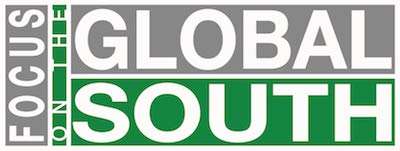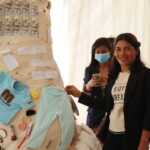Newzimbabwe.com 07/29/2006
By Kuthula Matshazi
By Kuthula Matshazi
Walden Bello, the executive director of Focus on the Global South and professor of sociology at the University of the Philippines said that developed countries want maximum entry into developing countries to non-agricultural goods by demanding that they cut their non-agricultural tariffs by 60-70 per cent while offering to cut theirs by only 20-30 per cent
NEO-LIBERAL forces among us have always been preaching incessantly that we must open our markets and entrench our country’s economy in the global economy driven by International Monetary Fund and the World Bank ideology if we were to achieve prosperity.
This has been said despite vast evidence of the spectacular failure in developing countries of a neo-liberal led trade system and talks initiated at Doha, Qatar in November 2001 under the antithesis title Doha Development Agenda.
At the beginning of the talks, countries had committed themselves to reducing trade barriers to facilitate free and fair trade, reduce farm subsidies so that farmers from the developing countries could compete with their counterparts on a level playing field.
Facilitating developing countries, including Africa to engage in free and fair trade would have enabled these countries to unlock their potential to earn profits that would raise the standards of living.
However, the World Trade Organisation Director-General Pascal Lamy has just suspended the trade talks because they have failed to make any headway. According to Lamy, ministers from six countries tasked with the negotiations from Australia, Brazil, the European Union, India, Japan and the United States failed to make progress on two aspects of agriculture namely market access and domestic support. There was no move at all on the non-agricultural market access, according to Lamy.
Walden Bello, the executive director of Focus on the Global South and professor of sociology at the University of the Philippines said that developed countries want maximum entry into developing countries to non-agricultural goods by demanding that they cut their non-agricultural tariffs by 60-70 per cent while offering to cut theirs by only 20-30 per cent.
The talks were suspended – instead of calling them off – so that the WTO could lock in pockets of neo-liberal protocols that they had already achieved over the years. He hopes that the talks could be resumed where they were left off should there be a move in positions from the developed and developing countries.
As in Cancun, Mexico in 2003 and Hong Kong in December 2005, the developed countries have refused to back down on illegal farm subsidies that encourage overproduction and dumping of agricultural products in the markets of developing countries thus depressing commodity prices much to the detriment of farmers from the developing world.
In the spirit of free and fair trade, the developing countries have been attempting to export their agricultural products to the developed countries but they have been slapped with high import tariffs. Agriculture is a major foreign revenue earner for most developing countries and therefore the adverse market conditions for agriculture have been greatly affecting the economies of these countries. Indian Foreign Minister, Kamal Nath is reported in the Washington Post blaming the US for the lack of progress, “Everybody put something on the table except one country who said, ‘We can’t see anything on the table’”.
The positions of both the US and EU are determined by political considerations. This is interesting because we have heard our Zimbabwean neo-liberals tell us that political considerations must not trump economic ones. This is a very false self-serving theory because whether the neo-liberals want it or not, political considerations do trump economics. Their positions can be explained by either blatant ignorance or a desire to blindfold the gullible public so that they could advance their agenda.
Here are two examples of political considerations that trump economics that are driving the positions of the US and EU in the Doha trade talks. The Guardian newspaper of Britain reports that the US position is influenced by the farm lobby, which has arm-twisted the US Congress into blocking its trade negotiators from tinkering with that country’s damaging agricultural subsidies.
The EU position, on the other hand, according to the Guardian, is hostage to politics of member states who prefer protectionism to competition. The US is said to have offered “creative accounting and subsidy reshuffles rather than real reform”.
The Economist magazine of Britain reported a leaked paper written by EU Trade Commissioner, Peter Mandelson, that he had been making secret plans based on the focused failure of talks, to pursue an aggressive agenda to open foreign markets to its goods and services.
Against such a scenario, many observers of these trade talks are happy about the collapse because the deal that was on the table was damaging to the to the developing countries.
The Guardian’s John Hilary in an opinion editorial titled No Tears for Doha says that we must be thankful that the deal failed because it would have caused the loss of millions of jobs in developing countries through the Lean Production method – retrenchments and per capita task intensification.
According to Hilary, the EU and USA have always cared solely about getting significant new business opportunities for their own multinationals as a condition for taking part in the talks. Instead of pursuing a development agenda the talks are said to have degenerated to “an unapologetic market access agenda”.
Bello says that even pro-liberalisation institutions like the World Bank have warned that the successful conclusion of the Doha trade talks would yield negligible gains. For instance, reforms would generate about US$16 billion in 10 years, which would see the poorest billon people in the developing world increase their income by US$2 per year.
In essence, this pauperization of the people would be used to facilitate corporate expansion. Bello says that Africa would have been the worst victim of a successful Doha trade talks stemming from losses in both agriculture and industrial goods liberalization.


![[FS4P] Social movements, Indigenous Peoples, and civil society organizations continue to fight against the corporate capture of global food governance](https://focusweb.org/wp-content/uploads/2023/05/xBanner-media-impact-440x264.png.pagespeed.ic.d45SmmqS_I.jpg)
![[Event Invitation] The Hague Tribunal Judgment on Conflicting Claims in the South China Sea: Implications for the Philippines, China, the United States, and ASEAN](https://focusweb.org/wp-content/uploads/2017/04/xspratlys_1-339x264.png.pagespeed.ic.j8iHbl6cB2.jpg)




